Dear Isabelle, I have received your subliminal messages and am flying to Paris soon. I am on my way. Shall any other cinephiles or Twitter memes enthusiasts wish to join me on this crusade, I will proudly stand as their guide. All jokes aside, I had been meaning to write an essay on music and film for a hot second, and the ever-growing collection of insane Isabelle Huppert interview headlines in my social media bookmarks did not once leave my thoughts. So, today, I offer you a deep-dive into Isabelle Huppert’s quotes and filmography, with a lovingly curated playlist to match.
I’ve been accused of having a passion for perversion.
As a 17th-and-18th-century-obsessed wee lass in the late 2000s, I spent a lot of my free time — and frankly school time as well since any assignment was an excuse to talk about it — researching this time period, with a focus on the Saint-Cyr boarding school and anything related to Marie-Antoinette. The King’s Daughters (2000, dir. Patricia Mazuy) quickly became one of my favorite period dramas, and turned out to be my first on-screen encounter with Isabelle Huppert. In the movie, she plays Madame de Maintenon, Louis XIV’s secret second wife and the founder of the aforementioned Saint-Cyr school, intended to provide poor girls of noble ancestry with housing, food and education. Passion and perversion are heavily represented in the film, with Madame de Maintenon being a strict and devout Catholic, going so far as to have her teenage students flogged for their sins, mostly having to do with the lesbian love affair subplot. If you’re not sold on it yet, please consider watching it for the absolutely gorgeous costume design, courtesy of Edith Vesperini and Jean-Daniel Vuillermoz.
Who better to spearhead the passionate perverts movement than Ethel Cain, and her aptly-named latest standalone record, Perverts. Just like Isabelle, she finds solace in exploring the bizarre and the disturbing, turning atmospheres most would shy away from into gritty works of art. Someone needs to make an Isabelle Huppert best moments fancam to Ethel Cain’s recent hazy, drone-y music.
I may try yoga one day, but I prefer to sleep.
In Dormant Beauty (2012, dir. Marco Bellocchio), Isabelle Huppert plays the “divina madre”, a former famed French actress whose daughter Rosa falls into a coma, causing her to stop caring about her work or family life, and devoting all of her waking hours to praying for her recovery. The movie, though romanticized, is actually based on the true story of an Italian woman named Eluana Englaro, who fell into a decade-long vegetative state after a bad car accident, triggering nationwide discourse about the legality of assisted suicide. The movie’s title is an obvious reference to Perrault’s (or the Grimms’) Sleeping Beauty, with sleep not being a synonym for rest here either, but rather the depiction of a woman’s powerless state, with no agency over her own body. While Eluana/Rosa’s sleep is put to an end in an attempt to quiet down her suffering, the fairytale Sleeping Beauty really has no say in the matter, with her life only being returned to her on the condition that she gets kissed by a prince — under the guise of true love. We are left wondering about the concept of her being asleep as a Schrödingerian limbo, a temporary responsibility-free escape from her duty as king’s daughter and future obedient wife. Circling back to Isabelle’s thoughts, that is one thing yoga does not offer.
Ooh, she’s sleeping tonight […]
Sweet daydream, ooh, sweeps in tonight
Ooh, sweeps in tonight
Produced by Mica Levi, Tirzah’s Sleeping reminds me of Blur’s No Distance Left To Run or even Deftones’ Mascara, with clearer, more soulful vocals that carry the listener into slumber. She repeats the lyrics like a lullaby layered over ambient noises that sink into the beat, but though the instrumental sounds almost ominous, Tirzah’s words are comforting, as if sung to a baby, putting us to sleep.
I never really learned anything from anybody.
In a 2024 reader interview conducted by Andrew Pulver for The Guardian, Isabelle Huppert shares the following ode to Austrian filmmaker, and The Piano Teacher (2001) director Michael Haneke.
He is wonderful to work with. One expects him to be particularly difficult and it’s the other way around. Everything is very simple and he’s attached to concrete, practical things. He says very little. He lets you do it exactly the way you want, but he wants it to be really real.
In the movie, for which she won the Best Actress award at the 2001 Cannes Film Festival, Huppert’s role as teacher is both musical and sexual, as she is drawn into a chaotic and masochistic relationship with one of her much younger piano students. Upon deciding to take on the role of director on this project, Haneke only agreed to do so if Isabelle Huppert was cast as the lead. She mentions barely having doubts about being offered the part, even then.
[What draws me in when selecting projects is] mostly the director, because I always believe it’s the key piece of the ensemble. If you take material like The Piano Teacher […], if it wasn’t for Michael Haneke […], what would it be?
Even while working with Haneke, Huppert seems to not have been looking for, or offered, that much direction — or at least in a very hierarchized, academic way — from higher-ups in the film industry, standing as both her own student and her own teacher.
Shout out to my aunties for that female love
[…]
Fuck this industry, bitch, I'm in these streets
Lord, take my back, the devil entered me
I’m not claiming that Isabelle Huppert is saying fuck that industry, per se, but she is carrying herself as a strong autonomous, and yet poised professional in the heavily male-dominated film industry, and stating that no one taught her anything in her fifty-year-long career. I like to understand this as her especially insisting that she did not learn from men in film, but maybe just a little from her aunties, or the women who came before her in this industry. Not to mention, alongside the ghost of acting and characters past, Huppert is not one to shy away from roles involving demonic possession, as seen in Andrzej Wajda’s The Possessed (1988). Lord, take our backs, the devil has entered Isabelle Huppert!
No noise.
This little quote snippet is actually taken from an Entertainment Weekly interview conducted during Huppert’s Oscar campaign for Paul Verhoeven’s Elle (2016). When asked about her favorite movie theatre snack, she is adamant.
No snack, no drink, no food. Just focus on the movie. No noise.
Though not really related to food, this made me think about South Korean director Hong Sang-soo’s Claire’s Camera (2017), which I recently watched after getting possibly the most important email ever, headlined “Isabelle Huppert week on Mubi”. You can imagine my excitement. In the movie, Isabelle Huppert stars as Claire, a music teacher (again!) and avid photographer who never goes anywhere without her camera, which leads her to witness events in the other characters’s lives, including that of fictional director So Wan-soo, who happens to be in Cannes with his film distribution company crew. The lives of Claire and the company members begin intertwining, as seen through her candid snaps.
Claire’s Camera is quite contemplative and a lot of its scenes don’t feature Huppert, which I was surprised about because I was expecting her to be an omnipresent lead. One of the things that struck me about the movie was the lack of unnecessary adornments — a lot of the shots are silent or very quiet without any ambient noise added in for drama, and Huppert’s acting is very laidback, making the film seem almost like a documentary. She is effortless in her portrayal of Claire, her speech unabashedly French-accented and her attitude raw, what you would expect from running into her on the street. No add-ons. No noise.
Musically speaking, I was looking for some kind of ambient, stripped-down piece to illustrate this quote, and then remembered the hours I spent streaming the Silent Hill 2 soundtrack, which in my opinion is one of the best video game OSTs ever (though The Path’s has become a recent favorite). Composed by Japanese musician Akira Yamaoka, the soundtrack is a great example of intentional emptiness in sound design and carefully selected, but never overbearing, field recording-inspired digital sound effects. On the Silent Hill 2: Making of CD released in 2001, Yamaoka is quoted as saying :
Selecting moments of silence is another way of producing sound.
No over-the-top sonic jumpscares. No vocals taking over the melody. No noise.
(on Isabelle Adjani) If we were in a psychiatric hospital, I would be with schizophrenics and she with paranoids.
Isabelle Huppert stars as Anne Brontë in André Téchiné’s The Brontë Sisters (1979), alongside Isabelle Adjani and Marie-France Pisier, the three of them being some of France’s most famous actresses at the time. Though Isabelle squared looks like a power duo on paper, the two actresses actually famously did not get along, making the filming of this movie challenging even for veteran director Téchiné. Reports on their rivalry differ, with some sources saying Adjani felt Huppert was benefitting from dating Daniel Toscan du Plantier, then director of French film company Gaumont, who allegedly took away roles from other deserving actresses to give them to her. Others claim Huppert was actually the bitter one, having fallen in love with The Brontë Sisters’ cinematographer Bruno Nuytten, who ended up dating Adjani and even fathering her child before they eventually broke up. Going even further into the deep dive, a Nouvel Obs piece titled The War of the Isabelles (La guerre des Isabelles) details their rivalry, as fuelled by their respective agents who continuously made sure neither actress got more screen time than the other.
Radiohead’s third studio album Ok Computer (1997) features the song Paranoid Android, written by Thom Yorke after an unpleasant encounter with a woman in a bar. A Q Magazine article from October 1997 titled Death Is All Around... gives us some more insight on the song’s backstory, in conversation with Yorke.
You do often see the demons in people's eyes. They're like fucking devils. Believe that or not. […]
The "kicking squealing gucci little piggy" in Paranoid Android was inhuman. There was a look in this woman's eyes that I'd never seen before anywhere. Whether that was down to me being exhausted and hallucinating... no, I know what I saw in her face. couldn't sleep that night because of it.
When asked about her co-star, Isabelle Huppert is quick to make a statement rebuking any similarities between them, claiming they are so different that they would not even be hosted in the same aisle of a hypothetical psych ward. Categorizing Adjani as belonging with the paranoids puts Huppert in Yorke’s shoes, letting it transpire that she sees her colleague as potentially demonic, with an unmistakable, unsettling twinkle in her eye. Within the same metaphor, she paints herself as belonging with the “schizophrenics”. Though it appears on the surface that she is simply being fair and civil by diagnosing herself alongside a rival she hates and thus being able to pass as making a bizarrely ignorant statement rather than trash-talking another industry professional ; I can’t help but wonder if Huppert aims at offensively positioning herself above Adjani by claiming her split-personality tendencies are an asset in her character-building and portrayal, while her colleague is depicted here as a mere “paranoid”, slightly insinuating that if Huppert has a personality type fluctuating between highs and lows, Adjani’s only has lows.
I was never the woman behind the man… The only place I could take was the main place.
Throughout her filmography, Isabelle Huppert’s roles have always been complex, at times controversial, but always bold. In a March 2024 interview with Sarah Crompton, Huppert gives us an insight into her commitment to playing unapologetic, sometimes unsavory women on screen.
“From the beginning, that was a conscious choice,” she says, “but at the same time I had no choice, because I was never really asked to be the woman sitting behind the man, the woman giving value to the man. You have to be a certain type of woman [to be that]. That was never my case, so in a way, the only place I could take was the main place. Which was fine.”
Does she see that as a feminist act? “Yes, but in a very selfish way, not as a very political statement,” she says, thoughtfully. “At the end of the day, of course it’s feminist to give the main position to the female character in the film. But I think that the feminist statement would have to fight for some bigger purposes.
In Violette Nozière (1978, dir. Claude Chabrol), Isabelle Huppert plays the real-life eponymous figure, famous in French for poisoning her abusive parents in the early 1930s, resulting in double parricide. However, after her initial conviction and sentencing to death by guillotine in 1934, Violette Nozière eventually got pardoned by the French government after twelve years behind bars. More than anything, a lot of compassion for Nozière transpires from the movie, from the director but also from Huppert herself, who was Chabrol’s first and only casting choice for the part. In a 1978 television interview, she states:
The horror of her actions is but a reflection of her suffering.
Refusing to stand silent as her father’s victim, Violette Nozière sets her mind on committing the most radical act to remove him from her life, or anyone else’s for that matter. Though Nozière’s case is a very literal patricide, the concept of killing the father (or some kind of father figure) is for most intrinsically linked to the ability to gain emotional independence.
'Cause she work like a boss, play like a boss
Car and a crib, she 'bout to pay 'em both off
And her bills are paid on time, yeah
[…]
She got her own thing, that’s why I love her
Never the woman behind a man, Isabelle Huppert — who has been working under her maiden name for over fifty years — could absolutely be the topic of Ne-Yo’s Miss Independent. In the same way we love and feel for Violette Nozière whose tragic actions were dictated only by her even more tragic life circumstances, she refuses to be defined by men. That’s why we love her.
I feel free doing crazy things like falling in love with my stepson.
This quote is a tad misleading and I feel the need to put it back into its context, in order to save my dear Isabelle from being perceived as an off-screen incestuous freak. In 2016, she slips into her muse attire for Polish director Krzysztof Warlikowski and his play Phaedra(s), a controversial elegy to love blending together three variations of the Greek myth’s narrative along with scenes from Hitchcock’s Psycho (1960) and Pasolini’s Teorema (1968), electric guitar riffs, and excerpts from written works by Canadian-Lebanese author Wajdi Mouawad, of Incendies (2003) fame. Review editor and writer Rosie Kinchen describes the play during a June 2016 interview with Huppert for The Times.
It is without a doubt the most French production I have ever seen, complete with pulsating merkins, prostitution and gonorrhoea. It left even some French critics wondering what was going on.
Yet Huppert’s performance is a tour de force. Over the course of 3½ hours she simulates sex acts, writhes around on the floor and grabs frantically at crotches (mainly her own).
Isabelle Huppert is no stranger to incestuous themes in screenwriting, having starred as character inspired by controversial photographer Irina Ionesco in her daughter Eva’s semi-autobiographical drama, My Little Princess (2011).
In the movie (and pretty much the real-life story), Isabelle Huppert’s character Hanna struggles to make a living as a photographer while dating a string of questionable men, who lead her to think about having her tween daughter Violetta, portrayed by Anamaria Vartolomei, model her art. However, that idea soon turns sour since Hanna’s visual work is overtly sexual and gets even more daring as the 12-year-old becomes its main subject, resulting when word gets out in her being shunned by her classmates ; and in Hanna coercing her into posing by depriving her of food if she does not cooperate. The nightmarish story of the Ionesco mother-daughter duo is quite infamous in France, but My Little Princess did strike inevitable controversy with foreign audiences due to the stomach-turning nature of the mostly-true events related, and Huppert and Vartolomei’s performance, strongly convincing in its lack of displayed affection. In an October 2011 interview for German newspaper The Frankfurter Allgemeine, Huppert states the following.
Shooting the film has been one of [my] more peculiar professional experiences because on the set [I] had had the feeling [I] was indeed the director's mother.
There is no right way to segue lightly into a song recommendation after talking about My Little Princess so I instead will turn to the stepson/mother or rather teenage boy/friend’s mom fantasy trope, Isabelle Huppert being, for lack of a better description, the ultimate French MILF. Fountains Of Wayne are no Hippolytuses, but if you squint just long enough, you might start to picture Phaedra as the notorious Stacy’s mom.
Stacy's mom has got it going on
She's all I want and I've waited for so long
Stacy, can't you see? You're just not the girl for me
I know it might be wrong, but I'm in love with Stacy's mom
My guiltiest pleasure? Imagining myself as a sadistic, manipulative murderer.
Chabrol’s 1995 psychological thriller The Ceremony is my favorite Isabelle Huppert movie. Loosely based on the 1933 case of the Papin sisters and Jean Genet’s play inspired by the story and titled The Maids (1947), The Ceremony tells the story of a young woman named Sophie (played by Sandrine Bonnaire), hired as a maid in an isolated mansion in a small village, where she later meets Huppert’s Jeanne, a jealous and agressive post-office clerk. Sophie and Jeanne’s respective histories of violence make for an explosive mix when put together and result in a tense, conflicted homoerotic relationship between the two women — eventually leading to an unspeakable crime.
If I could be your lazy in-love killer
Babyface maniacs in a four-wheeler
Infamous, murderous couple ridin' through the drylands
In The Ceremony, Huppert stars against a 28-year-old but almost younger-looking Sandrine Bonnaire, the epitome of a babyface maniac. After committing the crime, Jeanne (Huppert) takes the wheel intending to drive away from the scene in some modern-day, sapphic take on the story of Bonnie and Clyde — only for her partner (Bonnaire) to not follow her and walk out on her own ; and for Jeanne to quickly be killed by the local priest who had fired her only days before. The murderous couple riding fantasy is cut short, as the credits start rolling.
I want to understand insanity.
As Madame Bovary (1991), Isabelle Huppert stars in yet another of Claude Chabrol’s movies, inspired by Gustave Flaubert’s book by the same name, published in 1857. One disillusion after the other and indescribable ennui lead the young Emma, though privileged and living a perfect life on paper, to slowly sink into insanity, where her encounters with moral and financial bankruptcy eventually lead to her suicide. The story of Madame Bovary is a testament to a form of quiet, almost socially acceptable insanity — a predecessor of Marc Cherry’s Desperate Housewives (2004-2012), where dark secrets and madness seem to brew under the polished surface of an initially drama-free-looking small town. This descent into insanity is slow-paced though inevitable, seeping through the minds of regular people (who could very well be your friends, neighbors or family members) until they become unrecognizable, making its progress easy to understand, and a harrowing but riveting watch.
Well I confessed to all these crimes and they put me on trial
I was laughing when they took me away
Off to the asylum in an old black Mariah
Well it ain't home, but you know, it's better than jail
It ain't such a bad old place to have a home in
The Curse of Millhaven is the sixth track on Nick Cave & The Bad Seeds’ 1996 album Murder Balladsc — their best album in my humble opinion, and also one of the best English-language concept albums, ever. The scene is set in the real-life small town of Mill Haven, and relates a fictional series of murders shaking the bones of its poor villagers. The track describes all the crimes chronologically, with a body toll reaching 24 deaths throughout the lyrics, until it is revealed the dangerous murderer is no other than the fifteen-year-old narrator, Loretta. Sung from a first person perspective, The Curse of Millhaven sounds manically gleeful, especially as the crimes get more and more gruesome. Loretta ends up institutionalized in a psych ward, still singing about the additional people she wishes she’d had killed, and giving us an insight into her twisted, insane mind.
My favorite live performance of this song has to be the 2001 version at Le Transbordeur in Lyon, which you can watch below. Oh fuck it, I’m a monster, I admit it!
I Love Bushwick !
Isabelle Huppert has a few films set in New York (albeit not Bushwick specifically) in her filmography, but none I felt moved enough to write about.
However, did you know she recorded the French audiobook version of Patti Smith’s Just Kids? I sure didn’t, but here we are. This is just huge for me, I am guessing for at least ten of you guys too. As you wait for Patti’s new memoir Bread of Angels to be released later this year, you can at least satisfy your francophile cravings by listening to our French national treasure narrating the life of the voice of an American generation.
Much to everybody’s surprise, I am ending this essay on a Lana note. I was initially going to include Patti Smith’s cover of Lana’s Summertime Sadness, but Brooklyn Baby is an inevitable, and more fitting mention in this scenario. I hope you love it here.
Sources:
https://determineddilettante.blogspot.com/2006/10/isabelle-vs-isabelle.html
https://www.ina.fr/ina-eclaire-actu/1978-chabrol-et-huppert-a-propos-de-violette-noziere









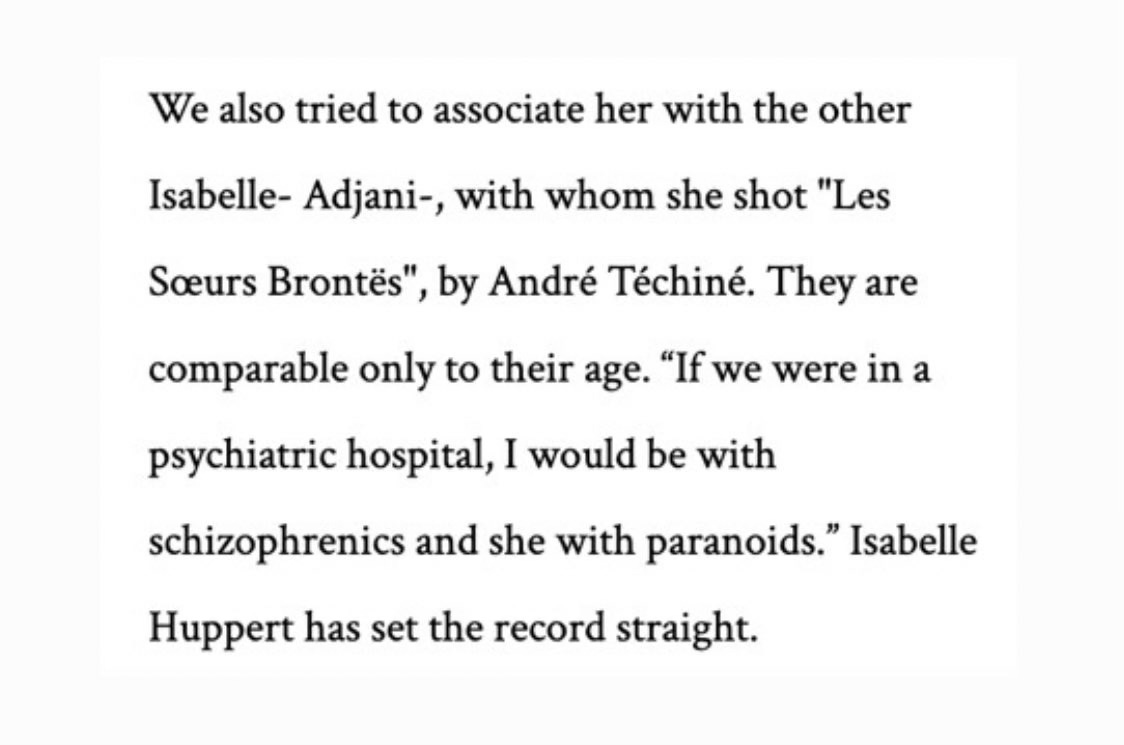
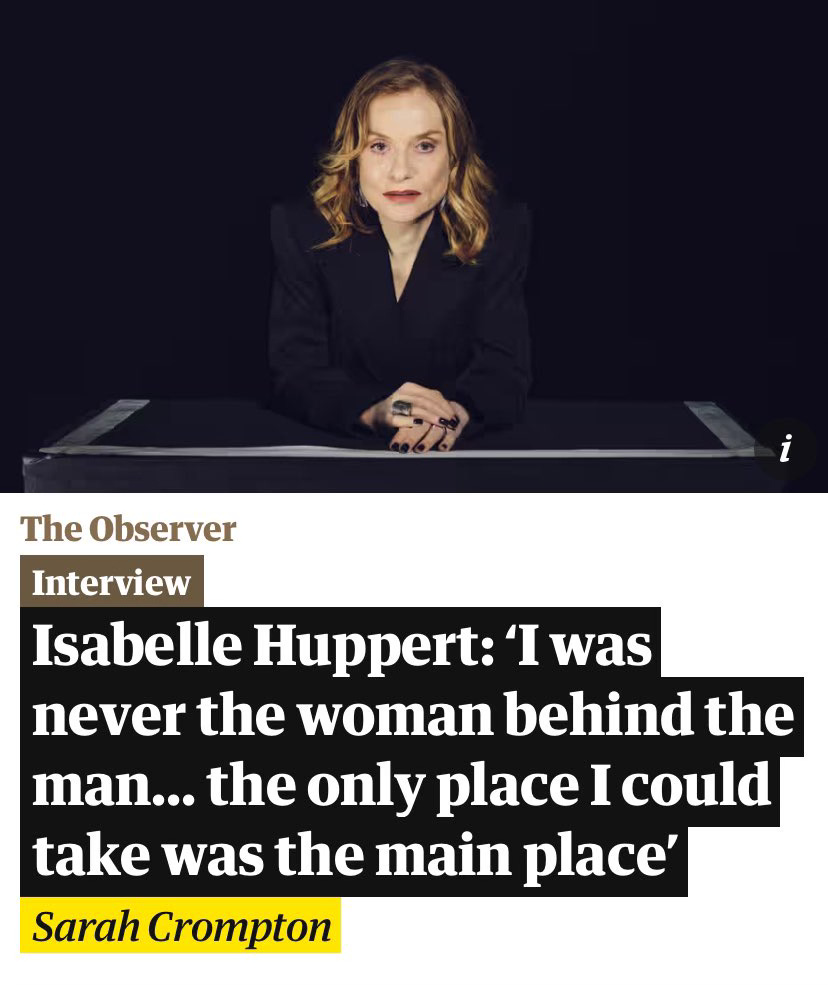
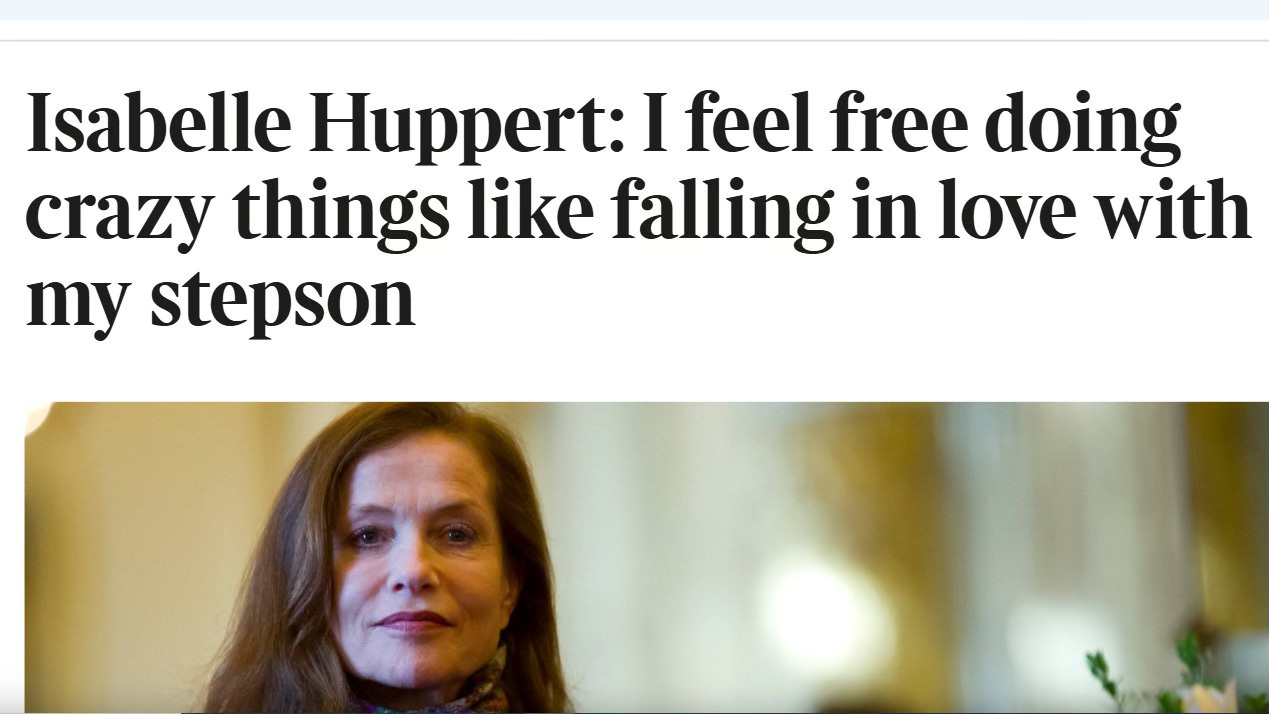
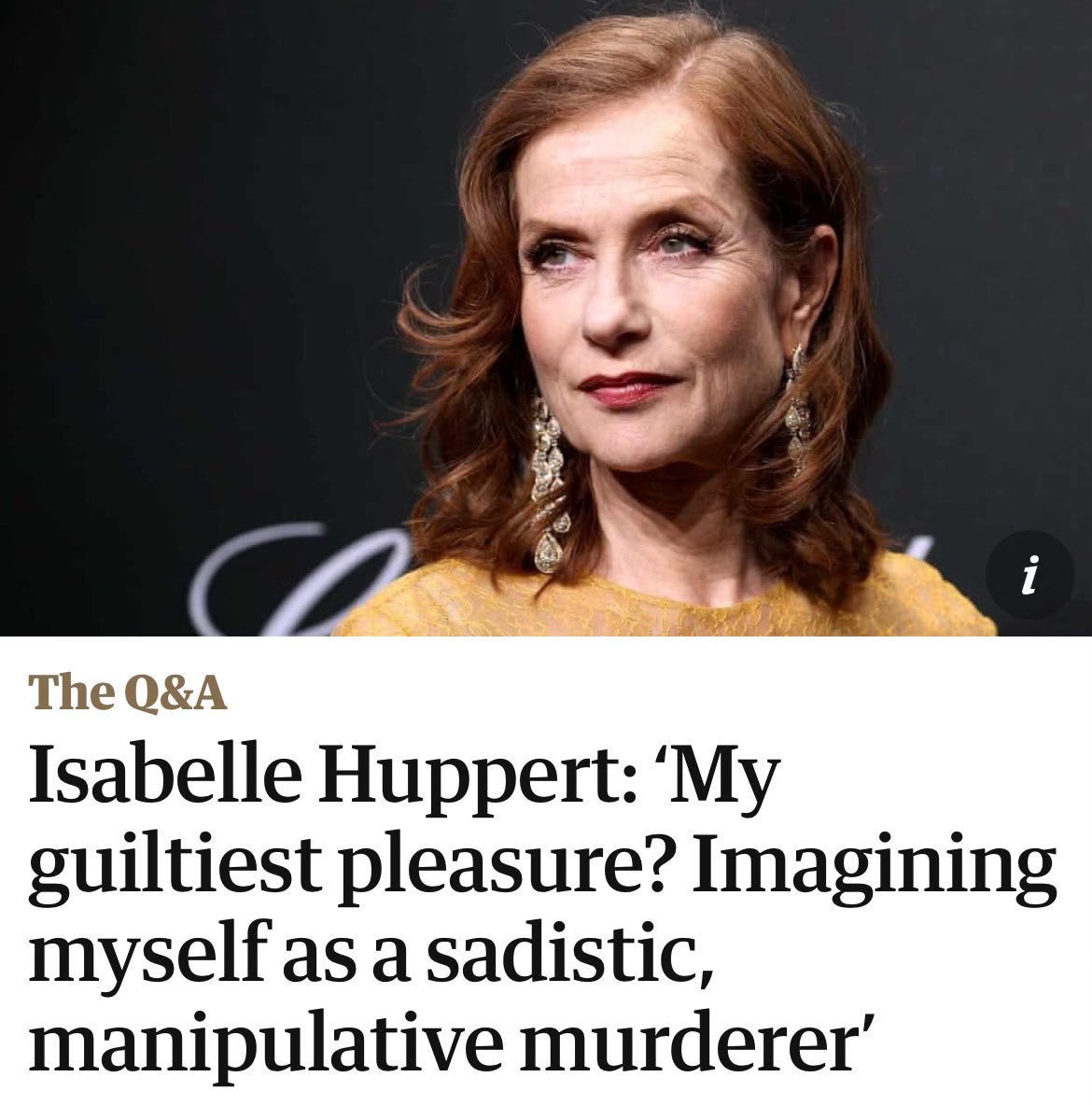
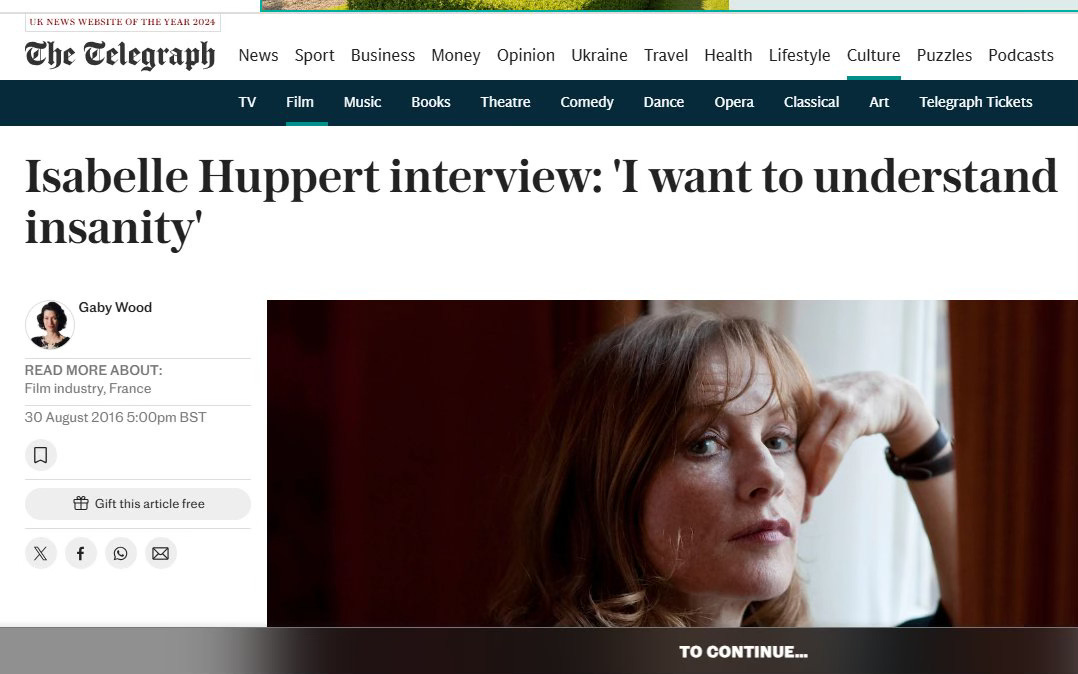

Love this 👏 theres so much I have to check out still 🙏 ❤️
Have u seen this lil documentary - she’s so cool http://rarefilmm.com/2024/12/isabelle-huppert-une-vie-pour-jouer-2001/